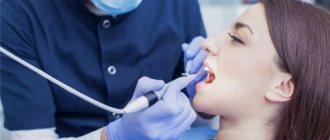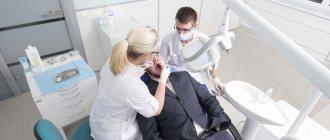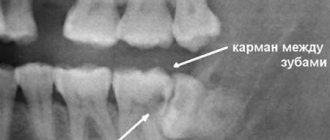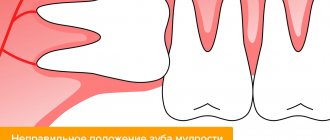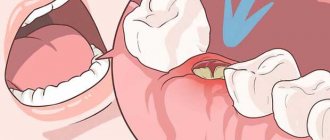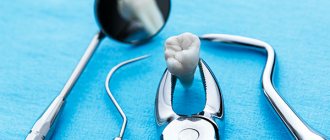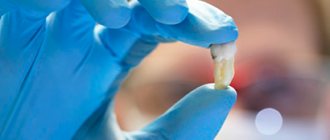Also watch: Dental treatment under a microscopeTreatment of dental cariesEndodontic dental treatment
Any type of dental treatment is aimed at alleviating the patient’s condition and restoring oral health. Pain after dental treatment is a common problem that every person has encountered at least once. In some cases, pain and discomfort are an inevitable consequence of the treatment procedure itself and pass quickly, while in others they indicate the development of complications and poor-quality treatment. You should never ignore pain after dental treatment, but this symptom does not always require repeated dental treatment.
Main causes
Dental treatment can be therapeutic or surgical, and pain can appear after any type of intervention. In most cases, mild or moderate pain is a physiological reaction of tissues to the manipulation, can be easily eliminated by taking anti-inflammatory or painkillers and lasts several days after a visit to the dentist.
Also, pain after dental treatment appears due to complications and violations of the technique of performing medical manipulations. Pain is most often observed after:
- dental fillings;
- root canal treatment;
- removal of a diseased tooth, cyst or granuloma.
The dentist must advise the patient about how the recovery process will occur after treatment and for what symptoms it is necessary to come for another appointment. Also, for comfortable well-being after treatment, anti-inflammatory and, in some cases, antibacterial drugs are prescribed. If, despite following all the doctor’s recommendations, the pain continues to bother you, then it is best to undergo another examination by a specialist.
Pain after dental filling
Dental filling is the most frequently performed treatment procedure in any dental clinic. Due to the high prevalence of caries, each dentist installs several fillings per day. However, even such routine dental manipulation in some cases leads to complications and pain in the patient after treatment.
Slight pain when putting pressure on a filled tooth normally goes away a few days after the filling is installed. To reduce discomfort, you can take anti-inflammatory medications as prescribed by your doctor. But if the pain does not go away and intensifies over time, then this may indicate a complication after dental filling. The main causes of pain are:
- Improper grinding of the filling . Grinding is one of the final stages of tooth restoration using filling materials. This procedure is performed to make the filling smooth and consistent with the patient's bite. If the dentist incorrectly polished the filling and it remains too high, this leads to improper closure of the jaws and injury to the mucous membrane. Also, an unsuitable filling increases the sensitivity of teeth to various irritants (exposure to cold, sour or sweet foods). In such cases, you need to contact your dentist again so that he can adjust the height of the filling and the associated discomfort will no longer bother you.
- Allergy to filling materials . Materials for filling teeth are being improved every year, but the use of even the most modern filling materials cannot completely eliminate the occurrence of an allergic reaction. Symptoms of individual intolerance include swelling, pain, redness of the gums, and a strange taste in the mouth. It is important to understand that similar symptoms occur if you are allergic to a local anesthetic drug. If you suspect that you are allergic to a temporary or permanent filling, you should immediately contact a dental clinic, where the placed filling will be removed from the tooth and filled with other materials.
- Violation of filling technique . Pain after dental treatment sometimes appears if the dentist performed one of the filling stages incorrectly. Pain may occur due to overheating of dentin when preparing a carious cavity with a drill, which leads to inflammation of the pulp. Pain also appears if a special acid is applied for a long time, which improves the fixation of the filling on the tooth, or if the drying technology is disrupted. Any mistake when installing a filling can lead to increased tooth sensitivity and pain. The method for correcting complications is selected individually.
- Development of secondary caries . In some cases, an infectious process can develop under a previously installed filling. This occurs due to insufficient treatment of the carious cavity before installing the filling, as well as due to the loose fit of the filling to the natural tissues of the tooth. The danger of this process is that it is more difficult to visually notice secondary caries. Signs of pathology are darkening of the enamel and pain in the tooth affected by caries. In such cases, the dentist removes the old filling and re-treats the caries.
- Incorrect diagnosis . Pain after filling teeth occurs in cases where the dentist missed the presence of pulpitis in the patient and did not check the condition of the root canals of the tooth. Moreover, even after a high-quality filling is installed, complaints may remain of aching, intense pain of a bursting nature, which intensifies with chewing and biting. To prevent further spread of the inflammatory process, cleaning and treatment of the root canals and removal of the nerve are required. After these manipulations, the canals are filled and the tooth is restored.
To avoid complications and pain after dental filling, a thorough preliminary examination and treatment using high-quality materials by an experienced dentist is necessary. If you experience severe pain after installing a filling, you should immediately contact your doctor.
At the dentist
If there are symptoms indicating complications, the doctor must determine the cause of the pathology. He performs the necessary diagnostics and visual inspection. Sometimes an x-ray may be needed.
Treatment methods are usually as follows.
When suppuration , the doctor cleans out the pus through an incision in the tissue; then prescribes antibiotics.
When it comes to trigeminal neuralgia , complex treatment is carried out with the prescription of drugs that help restore damaged nerves, as well as anesthetics.
Pathologies that arise after tooth extraction are treated differently
The pus is cleared from the hole, then a tampon with NSAIDs is applied. This is performed if there are complaints of a “dry socket”. In addition to the dentist, it is worth visiting an otolaryngologist to rule out concomitant pathologies.
- Antibiotics after wisdom tooth removal
Important ! For a speedy recovery, it is extremely important to maintain rest, ideally bed rest. It is better to avoid physical activity completely.
The amount of liquid you drink is limited, and it is better not to eat solid food temporarily. In order to reduce pain, you can take a painkiller prescribed by your doctor in the dosage indicated in the instructions.
Until the condition returns to normal, it is better to avoid eating hard, hot, fatty or too spicy foods.
The total time of therapy is up to several days. However, even after completing the course of treatment, the patient sometimes experiences weakness and mild pain.
Pain after root canal treatment
The need for root canal treatment worries the vast majority of patients in dental clinics. Many people are afraid of pain during and after the procedure. However, root canal treatment is primarily aimed at eliminating discomfort and pain in advanced stages of caries, when the nerve and pulp of the diseased tooth are involved in the pathological process.
To completely remove the affected tissue, the dentist opens, cleans, prepares and carefully fills the root canals of the tooth. This type of treatment is considered quite invasive and even after proper procedure, mild pain may bother the patient for 1-2 days. Unpleasant sensations do not affect general well-being or ability to work and are reduced by taking anti-inflammatory drugs (paracetamol, ibuprofen).
However, in some cases, severe pain indicates complications of root canal treatment:
- Exit of filling material beyond the root apex . A common complication of root canal treatment that occurs due to improper procedure technique. The patient may be bothered by aching pain that intensifies with load on the tooth. In combination with insufficient treatment of the canal, this can lead to severe periodontal inflammation, as well as intense pain after tooth treatment.
- Mechanical injury from tools . If, while cleaning the canals, the dentist does not fully comply with the accuracy and delicacy of the movements, then perforation (perforation) of the canal and damage to the periodontal tissues with the instrument are possible, followed by the development of inflammation and pain.
- Incomplete canal filling . In some cases, root canals have a complex structure and therefore are not completely filled with filling material. In unsealed areas, conditions are created for the development of an infectious process, which is accompanied by severe pain.
- Development of periodontitis . Advanced stages of caries and pulpitis can lead to inflammation of the periodontal tissues. At the initial stage of development of the disease, changes are not visible on an x-ray. Therefore, even after proper treatment of the tooth canals, the patient may complain of pain and an unpleasant feeling of fullness in the gums. As the disease progresses, granulation tissue or granuloma forms and must be removed surgically. In acute periodontitis, health worsens, the temperature rises, and general weakness is noted.
It is important to remember that during the first days after root canal treatment, slight pain (especially when putting stress on the tooth) is a physiological reaction. But if the pain is pronounced, interferes with meals, sleep and disrupts the usual daily routine, then it is necessary to be examined by a dentist and eliminate the complications that have developed as soon as possible. Treatment tactics in each case are selected individually, depending on the cause of the pain.
What to do if a wisdom tooth interferes with normal life
Modern dentistry initially suggests using painkillers, for example, Ibuprofen or Analgin, to relieve severe pain. Further, if it does not subside, you need to immediately contact a specialist. He will study the nature of the unpleasant sensations, evaluate the position of the “eight” and its role in the future (possibility of use for prosthetics). If it is unhealthy, then in 70-80% of cases the patient will be recommended to remove the wisdom tooth. This is due to difficult access to it. They also resort to its removal when it does not erupt for a long time and interferes with other molars.
A wisdom tooth causes a lot of trouble for its owner, and if you are faced with it, it’s time to visit an experienced dentist. Believe me, the problem will not be solved by itself! The specialists of the Kariesu.net clinic will quickly and reliably relieve you of pain and restore the joy of life.
Pain after tooth extraction
In some cases, effective treatment of advanced diseases involves the removal of a diseased tooth followed by prosthetics. After tooth extraction, pain, swelling and redness of the gums are a normal reaction of the body to tissue injury. You should be concerned if:
- the intensity of the pain does not decrease over time and is poorly removed by painkillers;
- the hole does not overgrow for a long time;
- purulent discharge appears from the wound;
- severe swelling of the mucous membrane occurs;
- body temperature rises.
The above symptoms indicate the development of an infectious process in the gum tissue. This happens if the tooth extraction technique is not followed or if the patient does not follow the doctor’s recommendations for oral care.
Gum inflammation
At first, the patient does not have any noticeable sensations after the operation. However, after some time, the gums may begin to bleed, fever may occur, and the tooth will become loose and loose in the gum. The pain often radiates to the ear. It is important to start treatment promptly, otherwise an abscess or fistula filled with pus may form. You can’t wait for it to fester - the sooner treatment is started, the greater the chance that complications will be avoided.
If pulpitis occurs, the pain radiates to the ear and also to the temple. With this manifestation, it is better to take a pain reliever.
- Why does my jaw hurt after wisdom tooth removal?
You should not rely on self-medication with traditional medicine - they can further aggravate the situation, since the root cause of inflammation is clear only after examination by a dentist.
Important ! Auxiliaries treat the symptoms, not the cause of the pain.
Inflammation of the gums after extraction causes pain radiating to the ear
If you treat symptoms while ignoring the cause of their occurrence, you can start the development of the disease to such an extent that you will have to remove a previously healthy tooth.
How to cope with pain after dental treatment?
To feel comfortable after dental treatment, you must first take proper care of your oral cavity. The dentist must tell the patient in detail exactly how to carry out daily hygienic care of teeth and gums. After installing a filling or cleaning the canals, it is important not to put heavy stress on the treated tooth for some time. The following methods are also effective:
- Cold compress . Exposure to cold is good for eliminating swelling and dulling pain after invasive dental procedures. On the first day after treatment, you can apply cold compresses to the cheek in the area of pain. In order not to overcool the tissues, it is important to take a short break every 10-15 minutes.
- Baths with antiseptics or medicinal herbs . In some cases, it is recommended to take baths with antiseptic solutions several times a day to prevent infection and relieve pain.
- Taking medications . To improve your well-being in the first few days after dental treatment, you can take non-steroidal anti-inflammatory drugs that quickly and effectively relieve pain, swelling and other unpleasant symptoms. A safe remedy must be recommended by a doctor. Antibiotics after dental treatment are also prescribed exclusively by the attending physician.
If you follow all the doctor’s recommendations, the pain after tooth treatment will gradually decrease and completely disappear after a few days.
Therapy for pain
If there is unpleasant pain radiating to the ear, the patient should not worry ahead of time. It usually goes away after two or even three days.
It is extremely important to contact specialists in whose work you can be confident. Treatment is carried out by qualified doctors in specialized medical institutions. Self-medication and traditional medicine methods can do more harm than good.
When contacting a doctor, be sure to notify him of any drug or other intolerance or allergic reactions. The doctor can select the necessary drug substitute to facilitate therapy. Don't forget to tell your doctor what medications you are taking (regularly and during the week before your appointment).
The doctor will select medications that can relieve pain
The dentist will indicate a list of recommendations that must be carefully followed in order to avoid complications.
You should not rinse your mouth, while brushing your teeth, you should not touch the socket with a brush or dental floss, food should be warm and without a lot of salt and spices. These rules must be followed for at least two days after the intervention. Compliance with them will help avoid serious and unpleasant consequences.
People suffering from diseases such as chronic hepatitis, diabetes mellitus, severe liver damage, and HIV infection should pay special attention to their health. In these conditions, there are disturbances in the functioning of the immune system, which is why various kinds of complications arise after any surgical interventions. To avoid this, it is necessary to carry out a course of antibiotic treatment under the guidance of the attending physician.
For three days, any alcohol and soda are completely excluded. You only need to chew soft food on the side opposite to the extracted tooth, so as not to touch the wound.
In the first three days after extraction, you should not drink alcohol.
Take painkillers prescribed by your doctor. To avoid increased pain at night, it is recommended to sleep on the side where the tooth was removed.
When do you need to see a doctor urgently?
Acute, throbbing pain after dental treatment, deterioration in general health and an increase in body temperature are a signal for immediate medical attention. The appearance of purulent discharge, severe swelling of the gum mucosa, or various sensitivity disorders in the oral cavity require a thorough examination by a dentist. You should also consult with a specialist if mild, aching pain bothers you for a long time after treatment or occurs when exposed to any provoking factor.
